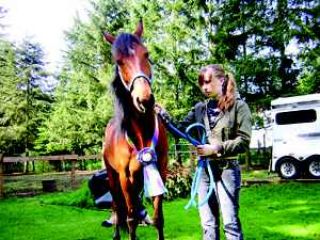SNOQUALMIE – You can learn a lot about business by taking care of a horse.
That is the philosophy of 4-H, an organization that has blended agrarian work and capitalistic principles into an opportunity for life skills few other groups can offer, according to local parents. While the organization has a popular reputation as a group that has young people taking care of animals at fairs, Kevin Nikolaus and Janett Nikolaus of Snoqualmie are trying to get others to take a closer look at what 4-H can do for their children.
“It’s a wonderful organization,” said Janett.
The couple said the merits of 4-H make it appealing for parents looking to get their children involved in something greater than themselves, a principle that is ingrained in 4-H’s history that dates back to the late 1890s. At the turn of the century, most of the children in the country lived on farms, but many were heading toward the city. Concerned about how future generations would fair in a more urban environment, rural and business leaders started to form groups that would teach life skills through farming tasks. In 1902 (the official birth year of 4-H) a Ohio high-school principal named A.B. Graham formed a farm club for boys and girls. The club grew to other states and one group designed a three-leaf clover logo for the group. The group later adopted a four-leaf logo that stood for “head, heart, hands and health.”
The U.S. Department of Agriculture (USDA) realized the benefits of 4-H and sponsored the club by making it a part of the nation’s land grant universities. In 1862, Congress passed a law that would set aside land in each state to place a university. Each of those land grant universities, in turn, would have an extension office in every county.
The land grant university in Washington is Washington State University, which has extension office in King County that is the headquarters for the county’s 100 or so 4-H clubs. Carris Booker, lead faculty for King County 4-H, said 4-H has expanded to meet the needs of the modern youth by offering everything from cooking to computer classes. Once children grow up, there are opportunities for scholarships for college. They can also come back to their communities and be 4-H mentors.
“Where youth are is where we meet them,” Booker said.
For the casual observer, however, 4-H has meant ribbons and fairs. One of the most visible events at a fair can be the horse show where 4-H children show off their horses and their skills. While the horse skills are impressive, Janett explained that she didn’t get her three daughters (Kiele, 11, Alisha, 15 and Taylor, 16) involved in 4-H with the hopes of them becoming great equestrians. Rather, she wants them to work hard, independently and toward a reward that is tangible.
The horse competition in 4-H can teach all of those skills. While the normal rigors of training a horse are required for any equestrian show, a 4-H competition requires all of the work to be evident and documented. Any child showing a horse must keep a log of all the work and expenses that went into training, caring and showing their animal. That’s why Janett’s daughters have fat binder with paperwork detailing every expense and every minute having to do with their horses.
“It teaches patience and perseverance,” Kevin said.
The discipline the girls have taught themselves is seen in the discipline they have taught of their horses, Neverland’s Mister Darling (called Boo at the Nikolaus house). Although Kiele is dwarfed by the horse, it is Kiele who is in charge, and Boo knows it. Boo follows Kiele’s words to walk and stop. In fact, the horse can simply graze in Kiele’s back yard because it doesn’t go anywhere when its riding halter is on. Boo shows the same obedience to Taylor, who can jump up and mount Boo without a saddle, as well as slide off his back or down his neck. While other horses would go nuts if anyone tried something similar, Boo hardly raises his head from foraging for food. It took a lot of work to bring the horse around.
“Boo is a challenge,” said Taylor. “His attitude is constantly difficult.”
The training has paid off. At last year’s King County Fair, Taylor won three grand champion ribbons. Kiele won a high blue in English pleasure, and Alisha and Kiele went to state level in public presentation and got a blue ribbon. And that was just last year.
“There are many more [awards],” Janett said.
While getting and training a horse can be a monumental expense, Janett said it is not an insurmountable barrier for those interested in 4-H. The couple said that many people in the Valley keep horses and would love to let someone else take care of them. For anyone interested in seeing what 4-H horse competition is all about, training and taking care of someone else’s animal may be the best first step.
Kevin and Janett want more families to be involved in 4-H, but they also want commitment. Parents are the strong, silent partners in 4-H that help get children to and from meetings, practice and fairs. While there are plenty of opportunities for just hanging out at 4-H, the group requires dedication.
“We don’t want to be baby-sitters,” Kevin said.
* Those interested in 4-H can contact Kevin or Janett Nikolaus at (425) 888-6636 or William Johnson at (425) 396-7217.


